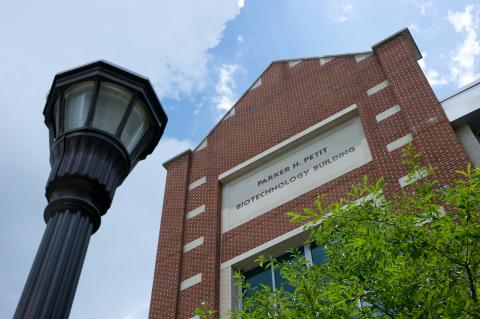event
Petit Institute Seminar
Primary tabs
"Stem Cell-based Vascular Repair and Regeneration"
David A. Vorp, Ph.D.
William K. Whiteford Professor of Bioengineering
Professor of Cardiothoracic Surgery, Surgery,
and the Clinical & Translational Sciences Institute
University of Pittsburgh
Abstract
The broad scope of David Vorp’s Vascular Bioengineering Laboratory includes the biomechanics, “mechanopathobiology”, and tissue engineering and regenerative medicine of tubular tissues, primarily the vasculature. This presentation will focus on the work in the lab that utilizes mesenchymal stem cells (MSCs) in the development of tissue engineered vascular grafts (TEVGs) and in the regenerative repair of abdominal aortic aneurysm (AAA). More than 500,000 coronary artery bypass grafts and 50,000 peripheral bypass grafts are used annually in the US alone. Currently, most multiple bypass procedures for small diameter (5mm in diameter or less) rely on the use of the patient’s leg veins for graft material, since arterial segments are limited in number, and successful synthetic graft options do not exist for these applications. Only 69% of the patients bypassed with vein grafts, however, reach a 10-12 year period without needing another invasive procedure. Vorp and his team have developed approaches to create TEVGs from the patient’s MSCs. Results of small animal studies to date have been quite promising and suggest that TEVGs using these cells will regenerate into functional arteries, potentially useful for arterial bypass applications. This presentation will give an overview of the work to date, as well as discuss practical barriers to translation of the technology to the clinic. AAA is a progressive disease that can take years to reach the point of rupture or the need for surgical intervention. Though the exact etiology is unknown, aortic aneurysms are characterized by a highly inflammatory environment, considerable loss of elastin, dysfunctional smooth muscle cells, and an elevated level of matrix proteases. In combination, these characteristics lead to a runaway cycle of destruction. Vorp’s lab is currently exploring is the use of MSCs to target these pathological processes as a potential treatment for AAA. This presentation will also show results from initial studies using an elastase perfusion mouse model suggesting that periadventitial delivery of MSCs may be successful in halting vessel dilatation and preserving elastic lamella structure.
Biography
David A. Vorp, Ph.D. is the William Kepler Whiteford Professor of Bioengineering, with secondary appointments in the Department of Cardiothoracic Surgery, the Department of Surgery, and the Clinical and Translational Sciences Institute at the University of Pittsburgh. He received both his B.S. and Ph.D. degrees in Mechanical Engineering from the University of Pittsburgh in 1986 and 1992, respectively. Vorp served as the Department of Bioengineering’s graduate program chair from 2001-2009, as the founding Director for the Center for Vascular Remodeling and Regeneration, as the Co-Director of the Center for Medical Innovation, and as the Interim Director of the Petersen Institute for Nano-Science and -Engineering.
Vorp has worked closely with clinical colleagues to develop a multi-disciplinary, NIH-funded research program focusing on abdominal aortic aneurysm disease, vascular “mechanopathobiology”, and tissue engineering and regenerative medicine applications for vascular and urethral systems. Vorp has published 110 peer-reviewed articles to date, and currently serves on three editorial boards. His research has been supported by nearly $9 million in funding as principal investigator (PI), and an additional $4 million as collaborating investigator, from foundation and federal agencies, including the American Heart Association (AHA) and the National Institutes of Health (NIH).
In 2009, Vorp co-founded Neograft Technologies, Inc., which focuses on the commercialization of AngioshieldTM, a vein graft modification technology developed in his laboratory which underwent “first-in-man” studies earlier this year. He currently holds four patents in this and other technologies.
In 2011 Vorp was recognized with the Van C. Mow Medal from the American Society of Mechanical Engineers (ASME), was twice awarded a Pitt Innovator Award, and received the Carnegie Life Sciences Award in 2013. He served on the Executive Committee of the ASME Bioengineering Division (BED; 2006-2015), serving as ASME BED Chair from 2013-2014. Vorp was elected to the Board of Directors of the Biomedical Engineering Society (BMES) for two terms (2006-2009; 2009-2012), and is in his second elected term as BMES Secretary (2012-2014; 2014-2016), an executive post. In 2012, Vorp became the first non-MD President of the International Society for Applied Cardiovascular Biology, and was re-elected for a second term in 2014. Vorp is a Fellow of ASME, BMES and the American Institute of Medical and Biological Engineering.
The Parker H. Petit Institute for Bioengineering and Bioscience, an internationally recognized hub of multidisciplinary research at the Georgia Institute of Technology, brings engineers, scientists, and clinicians together to solve some of the world’s most complex health challenges. With 17 research centers, more than 170 faculty members, and $24 million in state-of-the-art facilities, the Petit Institute is translating scientific discoveries into game-changing solutions to solve real-world problems.
Groups
Status
- Workflow status: Published
- Created by: Colly Mitchell
- Created: 11/10/2015
- Modified By: Fletcher Moore
- Modified: 04/13/2017
Categories
Keywords
User Data
Target Audience

